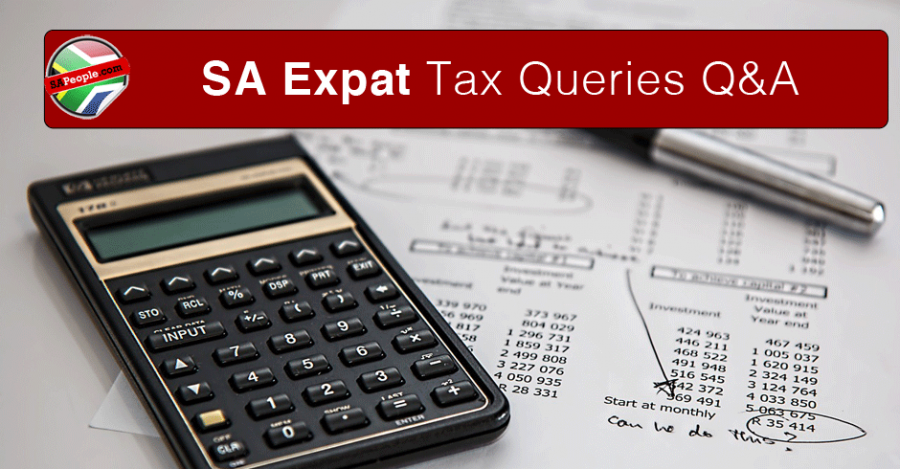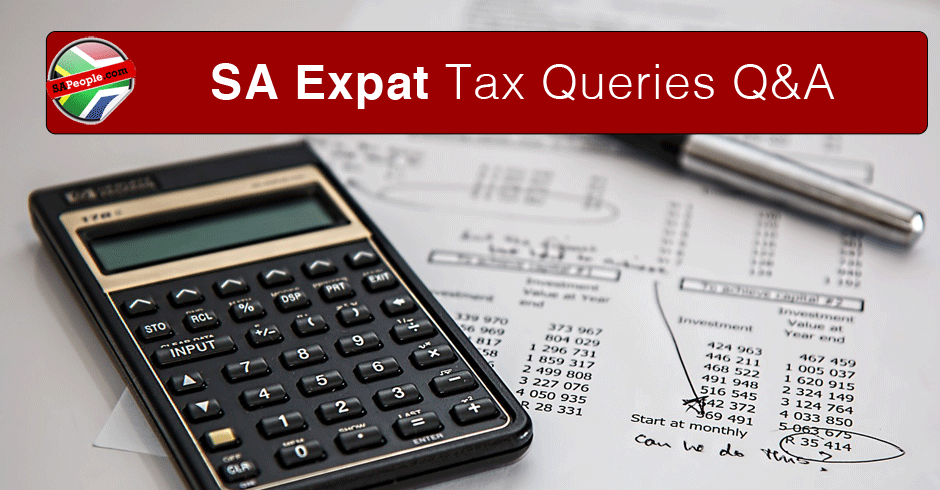
South African Expats’ Tax Queries Answered by an Expert
A couple of weeks ago the Treasury Department confirmed in Parliament that the law change forcing South African expatriates to start paying tax will go ahead, although some amendments were made including a R1 million tax exemption per year for expats. Many South Africans living abroad were confused and concerned about how the law would impact […]

A couple of weeks ago the Treasury Department confirmed in Parliament that the law change forcing South African expatriates to start paying tax will go ahead, although some amendments were made including a R1 million tax exemption per year for expats. Many South Africans living abroad were confused and concerned about how the law would impact them. Jerry Botha, Managing Partner from Tax Consulting South Africa, kindly offered to answer their queries. Here are the most asked tax questions and answers:

Q I left South Africa some years ago and had no idea that I needed to declare that I left. I have read mixed reports on this new tax proposal. I live and work in the USA as a green card holder. My income in the tech industry puts me over R1m. I already pay a high tax bracket here, and cost of living is very high. I am permanently outside of SA and own property here. Will I be affected? – Wayne M.
A Jerry Botha: The conservative and correct path is to do a “financial emigration” through the South African Reserve Bank and SARS. This means you are placed on record with the South African Revenue Service and the Reserve Bank as being “non-resident” for tax and exchange control purposes. The new law change only impacts South African tax “residents” and not “non-residents” for tax purposes.
Q I would just like to enquire if the new tax laws will affect non SA Citizens working abroad? – Michelle P
A JB: The South African tax law does not operate on “citizenship”. This is actually not even a factor which is considered. There are two tests to become tax resident being either (a) an intention test, which is known as whether you are “ordinarily resident” in South Africa (please note this test is complex and you cannot just decide this yourself without first understanding the law – you can search for SARS Interpretation Note 3 or send donne@taxconsulting.co.za an email for copy thereof), or (b) meeting a days’ test. As a South African abroad, you need to be primarily concerned with this test of being “ordinarily resident” in South Africa – the days test would typically not apply.
Where you are a non-citizen of South Africa, the question is what is your status with South Africa? Where your status is that of holding a “permanent residency” permit for South Africa, the tax law change will most definitely apply to you. Permanent residents are non-citizens who were granted such a permit on the basis of an intention to permanently reside in South Africa. The reason these persons are considered to be “tax resident” in South Africa is because it would be a direct contradiction to tell Home Affairs you are “permanent resident”, but SARS you are not “ordinarily resident” in South Africa.
It is generally accepted that those who hold permanent residency certificates must declare themselves as tax resident to SARS and disclose world-wide income and capital gains tax. Obviously you can claim tax exemptions, but the start is that full disclosure should be made. It may also be noted that “permanent residency” status is under review by the department of Home Affairs and this will be changed to long term visas, using a point system like Canada or Australia. You can contact tasia@expatweb.com for a copy of this emigration White Paper.
Q I live and work in Tanzania and am taxed here, and have been for the past 10 years. I only have a South African passport and each year I get a visa to remain in Tanzania. I have only visited South Africa for one week in the past three years. I would be above the R1 million threshold. Do I have to now pay tax to SA too? – Nicholas D.
A JB: The start is to consider whether you are “ordinarily resident” in South Africa and see SARS Interpretation Note 3 references above. Where you are still considering South Africa as your real or main home, you need to declare your world-wide income and capital gains in South Africa. The new tax law will impact you where you earn above R1m per year. Otherwise, where you have no intention to return to South Africa, you are non-resident for tax purposes and best is to confirm this through a financial emigration route.
It should be noted that Tanzania has also some very strict tax rules and you are probably tax resident in Tanzania as well. This means you can always claim Double Tax Treaty relief under the South Africa / Tanzania Double Tax Treaty. This is a complex process and must be done every single tax year. For this reason, we do not advise our clients to go this route, albeit a legal possibility.
Q I am extremely confused by this amendment. Does this only apply to people who are deemed to be SA residents through the ordinarily residency test or the time based tax ? Or does it apply to all SA citizens who no longer live in SA? E.g. a person who permanently lives in the UK, but is an SA citizen. Because this category of people currently do not pay tax in SA at all (except for SA source income). – Veronica S.
A JB: We understand the confusion as there is so much misinformation out there and “experts” who pronounce themselves on the law, but the words they use are not consistent with the law – this is a clear sign of the saying which rings true that “they just know enough to be dangerous”. There is no “deeming” provision under tax residency law, except where you try to use a double tax treaty to get around tax residency. This is complex to understand, but even more complex to get SARS to accept and you need to run this process each year with SARS, so our firm’s view is that this is a possible option, but not recommendable except where your case is very special.
The days test can be ignored for most expatriates, as where you are more than 90 days per year in South Africa, you will anyway be “ordinarily resident” in South Africa. Put differently, many South Africans remain “ordinarily resident” in South Africa, but only return home for a month or two a year. Citizenship is not part of our tax law. Therefore, I would focus on being not “ordinarily resident” in South Africa. Where you are in the United Kingdom, you also need to be careful on how you disclose yourself to the HMRS, especially where you claim to be a United Kingdom resident, ordinary resident (note different spelling and term than South Africa), but not domiciled in the United Kingdom.

The financial emigration remains probably the most clear cut option, and I would recommend to consider this here from a pure tax administrative perspective. The other alternative is to obtain a United Kingdom tax residency certificate and claim tax treaty non-residency, but having been with SARS through this process, it is not generally advisable.
These answers have been kindly supplied by tax expert Jerry Botha, Managing Partner Tax Consulting South Africa
